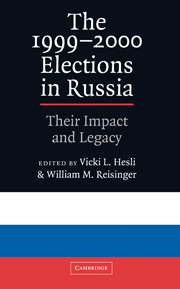Book contents
- Frontmatter
- Contents
- Contributors
- Acknowledgment
- SECTION I INTRODUCTION
- SECTION II PARTIES IN THE ELECTORATE
- SECTION III THE ROLE OF REGIONAL POWER
- SECTION IV PARTIES AND INSTITUTIONS
- 8 Instrumental Democracy: The End of Ideology and the Decline of Russian Political Parties
- 9 The Impact of the 1999–2000 Parliamentary and Presidential Elections on Political Party Development
- 10 Resolving the Problem of Preelection Coordination: The 1999 Parliamentary Election as an Elite Presidential “Primary”
- 11 Coalition Politics in the New Duma
- SECTION V CONCLUSION
- Bibliography
- Index
8 - Instrumental Democracy: The End of Ideology and the Decline of Russian Political Parties
Published online by Cambridge University Press: 23 October 2009
- Frontmatter
- Contents
- Contributors
- Acknowledgment
- SECTION I INTRODUCTION
- SECTION II PARTIES IN THE ELECTORATE
- SECTION III THE ROLE OF REGIONAL POWER
- SECTION IV PARTIES AND INSTITUTIONS
- 8 Instrumental Democracy: The End of Ideology and the Decline of Russian Political Parties
- 9 The Impact of the 1999–2000 Parliamentary and Presidential Elections on Political Party Development
- 10 Resolving the Problem of Preelection Coordination: The 1999 Parliamentary Election as an Elite Presidential “Primary”
- 11 Coalition Politics in the New Duma
- SECTION V CONCLUSION
- Bibliography
- Index
Summary
The results of the parliamentary and presidential elections of 1999–2000 represented a severe setback to the process of formation of genuinely representative political parties in the Russian Federation (Petrov 2000). In the race for the State Duma in December 1999, the big winner was the hastily thrown together Unity party, a hodgepodge of pliable state bureaucrats and opportunist regional governors that explicitly organized its campaign around a promise to represent no ideology whatsoever. Capitalizing on the wardriven popularity of Prime Minister Vladimir Putin, Unity attracted nearly a quarter of the party-list vote and an additional nine seats in single-member districts (SMDs) – despite the fact that its policy positions were kept almost entirely vague before (and after!) election day. The performance of an equally opportunistic electoral alliance, the Fatherland-All Russia (OVR) bloc, was surely well below the expectations of its founders Yevgenii Primakov and Yurii Luzhkov – but OVR still took third place with 13.3 percent of the party vote and twenty-nine SMD seats in regions loyal to the party leadership, further demonstrating the electoral advantages of relying on local political machines rather than appeals to political principle. The fourth-place showing of the promarket Union of Right Forces (SPS), which received 8.5 percent of the party-list vote, represented the coordination of a larger number of liberal voters than in 1995. Yet the SPS, too, benefited greatly from its close connections with the Kremlin, which actively supported its electoral campaign.
- Type
- Chapter
- Information
- The 1999–2000 Elections in RussiaTheir Impact and Legacy, pp. 163 - 185Publisher: Cambridge University PressPrint publication year: 2003
- 6
- Cited by

